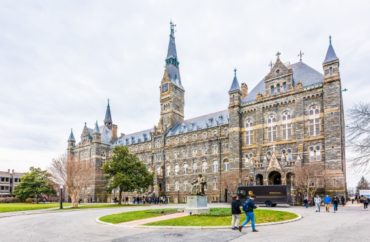
‘Because we’re at a point where students are coming out of class to go to the bathroom to cry’
Georgetown University students protesting an incoming administrator for his tweet criticizing President Joe Biden’s pledge to only nominate a Black woman to the Supreme Court have asked administrators to identity a place on campus where students can cry about the situation.
Constitutional law scholar Ilya Shapiro was slated to begin his new role as executive director of the Georgetown Center for the Constitution on Feb. 1 but has been placed on administrative leave pending the outcome of an investigation regarding his tweets.
Shapiro’s now-deleted Jan. 26 series of tweets read: “Objectively best pick for Biden is Sri Srinivasan, who is solid prog & v smart. Even has identity politics benefit of being first Asian (Indian) American. But alas doesn’t fit into the latest intersectionality hierarchy so we’ll get lesser black woman. Thank heaven for small favors?”
“Because Biden said he’s only consider[ing] black women for SCOTUS, his nominee will always have an asterisk attached. Fitting that the Court takes up affirmative action next term.”
Shapiro has apologized and deleted the tweets.
National Review reports that at a student protest Tuesday against Shapiro, they demanded he be fired — and that’s not all:
At another juncture, a student demanded that the dean cover for the classes that the activists had missed as a result of the sit-in, suggesting that the move should be part of a “reparations” package for black students. She followed up by insisting that students be given a designated place on campus to cry. “Is there an office they can go to?” she asked. “I don’t know what it would look like, but if they want to cry, if they need to break down, where can they go? Because we’re at a point where students are coming out of class to go to the bathroom to cry.”
“And this is not in the future,” she added. “This is today.”
The administrators took the law student’s query seriously. “It is really, really hard to walk out of class or a meeting in tears, and you should always have a place on campus where you can go,” Dean [Mitch] Bailin told her. “And if you’re finding that you’re not getting the person that you want to talk to or not getting the space that you need, reach out to me anytime — anytime — and we will find you space.”
Yet another student pressed the deans to send out an email attacking [Georgetown Black Law Student Association] critics.
“Something that’s important is to remind our classmates that are attacking us that they are only here because our ancestors were sold for them to be here,” she said. “And I think it’s a very important fact that is not talked about explicitly enough, because we are still being attacked. So I just would appreciate in whatever message that’s going out [to the student body], that our classmates are explicitly reminded: Do not attack the people who were sold for you to have this opportunity . . . That needs to be something that these people are reminded of, because they continue to attack us as if it is not on our backs that they are even here.”
National Review reports that administrators at the protest were very apologetic to students, but would not agree to fire Shapiro at this time.
Law Dean William Treanor, in his announcement regarding Shapiro’s suspension, stated that the scholar is being probed for whether he violated the institution’s “professional conduct, non-discrimination and anti-harassment” policies.
Shapiro has plenty of defenders, too. As of Tuesday night, some 150 professors from across the nation and political spectrum have signed an open letter defending the scholar and free speech:
But academic freedom protects Shapiro’s views, regardless of whether we agree with them or not. And debate about the President’s nomination, and about whether race and sex play a proper role in such nominations more generally, would be impoverished—at Georgetown and elsewhere—if this view could not be safely expressed in universities. Indeed, to the extent that people do think it’s proper for a President to promise to fill a position with a member of a particular group, they can only have real confidence in that conclusion if they know that the contrary view can be freely supported and discussed, and has been found unpersuasive on the merits rather than silenced by fear of firing. That is famously the way academic discourse about science operates. And it is true for moral and political judgments as well.
More broadly, firing Shapiro for expressing his views will send a message to others in Georgetown—both faculty (and especially untenured faculty) and students—that debate about matters having to do with race and sex is no longer free; that the promises of academic freedom are empty; and that dissent from the majority views within the law school is not tolerated. That will chill far more than just honest discussions of this particular Presidential nomination.
Read National Review’s report here, the faculty open letter here, and The College Fix’s coverage of the incident here.
MORE: Cornell students hold ‘Cry In’ over Trump victory
Like The College Fix on Facebook / Follow us on Twitter






Please join the conversation about our stories on Facebook, Twitter, Instagram, Reddit, MeWe, Rumble, Gab, Minds and Gettr.